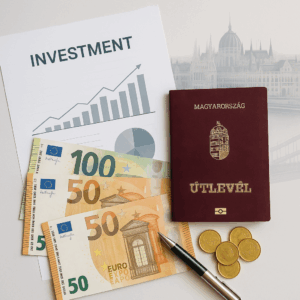What are the best investment options for Hungarian expats?
Hungarian expat investment options include local inflation-linked government bonds, Budapest real estate, blue-chip equities via UCITS funds, and euro- or multi-currency portfolios held through EU-regulated brokers.
Many expats also diversify internationally, holding global index funds, investment-grade bonds, and property in stable jurisdictions, to balance Hungarian forint (HUF) currency swings and policy risk.
Your mix should reflect your residency status, time horizon, and whether you earn or spend in HUF, euros, or another currency.
My contact details are hello@adamfayed.com and WhatsApp +44-7393-450-837 if you have any questions.
The information in this article is for general guidance only. It does not constitute financial, legal, or tax advice, and is not a recommendation or solicitation to invest. Some facts may have changed since the time of writing.

Investing as a Hungarian expat
Hungarian expats can take advantage of Hungary’s EU membership to access strong consumer protections, UCITS funds, and transparent cross-border investment rules.
The main strategic choices are:
- how much HUF exposure you want versus EUR/USD
- whether local tax wrappers are worthwhile given your expected time in the country.
Many expats blend local bonds and real estate for income and a home base with offshore global funds for growth and currency diversification.
How to invest as a Hungarian expat
- Check tax status: Confirm residency and treaty position using the 183-day and centre of vital interests tests.
- Choose your base currency: Match investments to your main earning/spending currency; hold HUF only for local needs.
- Use the right accounts: Residents may benefit from local tax-advantaged savings; non-residents should prioritize portable brokerage accounts.
- Diversify smartly: Combine select local assets for stability and income with global investments for growth and currency balance.
- Manage liquidity: Balance illiquid assets like property with ETFs and cash.
- Stay compliant: Track cost basis, file taxes on time, and follow CRS reporting rules.
Is Hungary a good country to invest in?
Yes, Hungary offers a mix of stability, accessibility, and yield that can be attractive for expats. That said, for Hungarian expats planning to live abroad long term—or permanently—it often makes more sense to focus on offshore investments.
Diversifying into foreign currencies, global funds, and jurisdictions with stronger property rights can reduce forint exposure and keep your assets aligned with your future spending needs.
You can still keep a home base allocation in Hungary, but the bulk of your portfolio may work harder for you abroad.
What are the best investment options in Hungary for expats?
The best investment opportunities in Hungary for expats include:

- Hungarian government bonds – Particularly the PMÁP (inflation-linked retail bonds) offer attractive real yields for residents.
- Budapest real estate – Strong rental demand in the city center and student hubs; long-term potential linked to tourism recovery and limited new supply.
- UCITS funds via Hungarian brokers – Access to diversified equity, bond, and mixed-asset portfolios under EU regulation.
- Local corporate bonds & blue-chip shares – Select exposure to the domestic economy through exchange-listed companies.
These are well-suited for expats with medium- to long-term plans in Hungary or those who want local exposure in their portfolio.
Best Offshore Investments for Hungarian Expats
The best offshore investments for Hungarian expats include:
- Global multi-currency brokerage accounts – EUR, US dollar, British pound, and Swiss franc-denominated portfolios for flexibility.
- UCITS global equity & bond funds – Tax-efficient and widely accessible through EU-regulated platforms.
- Precious metals & commodities held outside Hungary – A small allocation can hedge policy and FX shocks.
- Foreign property – Income-generating real estate in stable markets such as Western Europe, North America, or Asia-Pacific.
These investments provide access to broader markets, stronger legal protections, and currency diversification that may be harder to achieve with purely domestic holdings.
Hungarian Alternative Investment Options
Hungarian expats sometimes look at alternative investments, such as:
- Private equity & venture capital – Either via EU-based funds or regional investment vehicles.
- Agricultural land – Hungary has fertile farmland, though ownership rules and local market knowledge are essential.
- Distressed real estate – Opportunities in underdeveloped areas or renovation projects.
- Peer-to-peer lending – Higher-risk but potentially higher-yield platforms, often based outside Hungary.
Alternative assets can boost returns but require liquidity planning and careful due diligence amid their high risks.
Offshore Company Structures for Hungarian Expats
Hungarian expats with substantial assets, business income, or complex cross-border needs may benefit from setting up offshore structures.
Common uses include:
- International business companies (IBCs) – For location-independent entrepreneurs seeking low-cost, flexible jurisdictions.
- Offshore holding companies – To own shares, intellectual property, or international real estate in a tax-efficient manner.
- Trusts & foundations – For estate planning, asset protection, and succession structuring.
- Special purpose vehicles (SPVs) – For pooling investments or isolating risk in specific projects.
The choice of jurisdiction matters. Consider countries with strong rule of law, favorable tax treaties, and transparent compliance standards.
Hungarian Tax Residency
You’re generally considered a Hungarian tax resident if you have a permanent home in Hungary or if your center of vital interests like family, economic ties, and personal connections is located there.
If neither applies, the 183-day rule in a calendar year becomes the deciding factor.
Hungary is part of multiple double-tax deals, so tie-breaker rules can apply if you qualify as resident in another country as well.
Do expats pay tax in Hungary?
Yes. Hungarian tax residents pay personal income tax up to 15% on their worldwide earnings. Non-residents are generally taxed only on income from Hungarian sources.
Do Hungarian expats pay taxes on investments?
Yes. If you remain a Hungarian tax resident while living abroad, you’re still liable for 15% tax on global investment income, whether it’s dividends from foreign stocks, capital gains on overseas property, or bond interest.
Non-resident Hungarian expats pay 15% on Hungarian-sourced investment income only.
Do I need to declare foreign income in Hungary?
Hungarian tax residents must file an annual personal income tax return which includes their foreign income as well.
Once you’ve included it in your yearly tax filing, you don’t need to file any extra forms, submit separate reports, or provide ongoing updates to the tax authority about that income.
Non-residents file only for Hungarian-source taxable income (such as income from work performed in Hungary or investment income sourced in Hungary). You do not need to declare foreign income.
Hungarian tax on investments vs host countries
For Hungarian expats, the 15% PIT on investment income is relatively low compared to many Western European countries.
However, if your host country taxes capital gains or dividends more heavily, a treaty may still leave you with a higher total effective tax rate.
This is why many long-term expats structure their investments offshore to optimize for both jurisdictions.
What happens to my investments if I leave Hungary?
If you leave Hungary, your actual investments don’t automatically disappear or get frozen.
Your investments stay yours but the tax treatment shifts. Local assets become more cumbersome if you’re not based in Hungary.
Departing also doesn’t automatically trigger an exit tax, but you need to coordinate with both Hungarian and host-country tax rules to avoid double taxation and ensure your portfolio is still optimized for your new situation.
FAQs
How much to invest in Hungary to get citizenship?
There’s no direct citizenship-by-investment program, but residency routes start around €250,000 for property funds, with citizenship possible after several years of residency.
Which business is most profitable in Hungary?
Sectors like IT services, manufacturing, logistics, renewable energy, and Budapest real estate rentals tend to offer strong margins.
Can a foreigner buy property in Hungary?
Yes. EU citizens can buy freely; non-EU citizens usually need a local government permit.
Do you pay property tax in Hungary?
Hungary has no national property tax, but some municipalities levy local building or land taxes. Other transaction and ownership taxes also apply related to buying, selling, and renting property.
Is Hungary a high tax country?
Not by European standards. Hungary has a flat 15% personal income tax and 9% corporate tax, the lowest in the EU.
Is there a wealth tax in Hungary?
No. Hungary does not levy a net wealth tax.
Pained by financial indecision?

Adam is an internationally recognised author on financial matters with over 830million answer views on Quora, a widely sold book on Amazon, and a contributor on Forbes.



